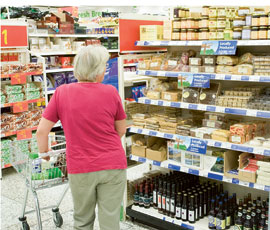Lower food prices drive inflation down

Falls in the cost of food contributed to a drop in inflation last month, according to official figures out today (15 November).
The rate of Consumer Prices Index annual inflation fell 0.2% to 5% in October, while the Retail Prices Index measure fell by a similar amount to 5.4%.
“Significant and widespread” discounting by supermarkets and good harvests for certain crops contributed to the lower food prices, while reductions in air fares and fuel prices also contributed to the lower inflation, the Office for National Statistics said.
Overall food prices fell by 0.9%, the largest fall for a September-to-October period since 1996, the ONS said. The largest price falls were for vegetables (down 2.4%), fruit (1.6%), milk, cheese and eggs (1.2%) and meat (0.7%).
IGD’s chief economist, James Walton, said the price falls reflected economic uncertainty and an easing of global demand.
“The UK imports about one-third of all food consumed; recent studies by DEFRA show global markets play by far the biggest part in determining the prices paid by UK shoppers, although the interplay between global and local markets is very complex.”
The organisation’s ShopperTrack research, based on interviews with 1,000 shoppers, showed 84% of shoppers used price as a factor when deciding which grocery store to shop at – the highest level for a year.
Mr Walton said shoppers were also shopping around more, as the average number of store types (eg hypermarkets, discounters, online) used in the past month was 3.3, up from 3.1 in the same month in 2010.
